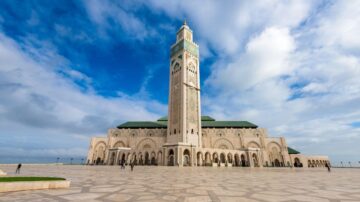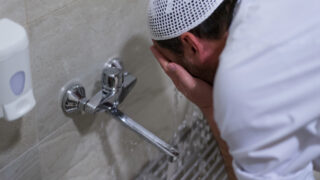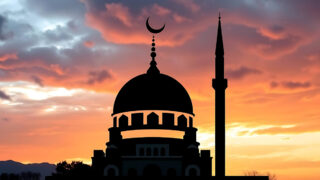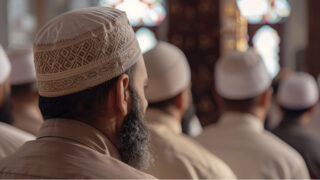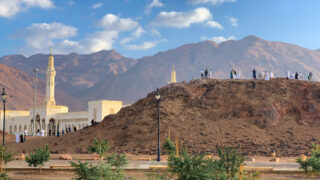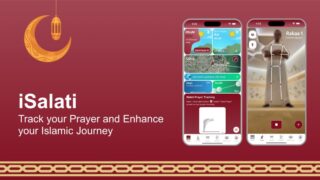My own journey to Islam is nowhere as dramatic or difficult. I did not actually travel in search of the truth. But I felt at one time-when I no longer believed in Christianity but had not yet found Islam-as if I was in a boat adrift, not knowing which way to go, where to find God (Allah). I wanted to know Him but I was lost. I understand Salman’s search. And, like him, once I knew the truth, I embraced it.
I grew up in a large Roman Catholic family and attended Catholic schools for twelve years. As a child I wanted to be close to God, though I could never talk about this or other personal matters with my family. For many years, even through my first year of college, I wanted to dedicate my life to God as a nun, either as a teacher or missionary to foreign countries.
As a teenager I was active in my parish. I played guitar at the folk Mass, was a lector at services, helped count the weekly collection, and taught weekly religious education classes for three years. But all the while I was having doubts about my religion.
I know that my doubts first started when I was about 11, and when I was 12 I didn’t want to be confirmed because of my doubts. I said that I didn’t believe in God, but I didn’t really doubt His existence-I never did-but I was beginning to doubt what the Church was telling me about Him. But at that time I couldn’t express all that, and for many years I don’t think I had a clear idea of just what I disliked or doubted. I think a lot of it was instinctual, “at the gut level”, rather than rational.
In high school, I continued to have doubts on and off. At that time I was particularly concerned with Right and Wrong and found it confusing that I could get such different answers from two priests who represented the same Church. One would tell us that there was an objective law that had to be followed while another would take a humanistic approach and say that moral issues were relative.
It was during my first semester of college that I recall having my first clear idea of what I disliked about Christianity. I briefly joined an evangelical organization. I didn’t know what “evangelical” meant, but I wanted to join a Christian group. This organization takes the Bible very literally and they believe that you have to accept Jesus Christ as your personal savior or you will be damned to hell. I went with them as an observer on one “mission” to talk with students in their dormitory.
Two years later I took an introduction to cultural anthropology course. It made me see whites (my own race) in a different light. I saw what a lot of damage they had done to the world in spreading their religion and culture and I even felt ashamed of being white (but never expressed it to anyone). I remember asking my favorite priest about it: what right did Christians have to do so? His answer didn’t satisfy me and it was the last I saw him. That was January of ’77. (After I became Muslim I stopped identifying myself as white. I am Muslim before all else.)
During the seven years I took to complete my bachelor’s degree, I tried attending Catholic Masses at different places where the services were geared towards young adults with different music or gimmicks. I also attended a Pentecostal service once-this is where people often “speak in tongues”-with other Catholic young adults. It seemed that to be close to God you had to keep on an emotional high, but I couldn’t maintain that intensity of feeling. I think more doubts came in with the emotional lows.
The last time I attended Mass was New Year’s Day 1978, and I walked out in the middle. The confusion and doubts I felt were giving me abdominal pains.
I remained agnostic, believing in God’s existence but not believing in revelation. I thought that God had created the world and then gone on permanent vacation. I knew from a course in college that the Old Testament had been written and pieced together over centuries and so doubted its truth. Everyone had a different idea of Christianity, of who would be saved. And of course there were Buddhists, Hindus, etc. If everyone had a different idea of what was the truth, I reasoned that there was no truth. (Now I know that there is one truth, but that some people have distorted it.)
I knew there was only one God, but I didn’t know Him. Every now and then I would pray for guidance. Not often, but I wanted to know Him if possible.
It never occurred to me to look into Islam at that time, probably because of what we had been taught about it in social studies. We learned the Five Pillars of Islam, that Muslims don’t eat pork, drink alcohol, or gamble, that they can have four wives, and that Muhammad (peace and blessings be upon him) wrote the Qur’an based on stories he had learned from Christians he met in his travels. Al-Hamduilillah (all praise be to God) that I didn’t look into it at that time, because the only books I would have found would have been written by non-Muslims and full of lies and distortions.
So I drifted for four years. I became interested in Islam during my third semester of a two-year master’s degree program. I was teaching English composition to undergraduate international students. Most of them were Muslim, most from Malaysia. Two young Malaysian men in my class were very outgoing and started talking to me about their country and a bit about Islam. I have always enjoyed learning about other cultures and religions, so I found it very interesting.
A few weeks later I was in a bookstore and saw a translation of the Qur’an and bought it. It was a translation published by Oxford University, done by a Jew who had re-ordered the surahs and said in the introduction that it was written by Muhammad. But it was the only one I found and I was curious. I knew that I’d probably have Muslim students later in my career (I was getting my masters in Teaching English as a Foreign Language) and I wanted to know what they believed.
If anyone had told me then that I would end up becoming a Muslim and even wearing hijab, I would have laughed. It was the farthest thing from my mind. I only wanted to understand my students better.
But God has His ways. On November 14, 1981, I started reading the translation of the Qur’an. The first time I read the translation of Al-Fatihah I heard a voice in me say, “Believe in Me.” “Who is this?” I asked. “Is it Jesus, or the Christian concept of God, or the Muslim concept of God, or the devil?” The more I read, the more disturbed I became, wondering if this was true. Yet I couldn’t stop reading for several days until finally I had to call one of those Malaysian guys and ask him about it. “But I don’t believe in revelation!” I said. “But maybe this is a sign that it’s real,” he replied.
I kept reading and then I started asking them questions. One thing that impressed me was that when they didn’t know an answer, they didn’t make one up as the Christians had. They said, “We don’t know and we can’t answer because if we say something wrong we’ll be in trouble with Allah (God). You have to ask someone who knows more.” After a few days I had to say, “Show me someone who knows more.”
So I called one of the two Saudi doctoral students who were serving as the imams in that town. He had me to his house (with his wife there, of course) and answered my questions-I even asked about how to pray-and lent me books. Unfortunately, I couldn’t keep the books and I didn’t think to record their titles and authors.
One of my first questions was about what happens to someone who never hears the message of Islam. His answer was that we are all born with an innate knowledge of God and if we are honest with ourselves and look at creation, we will acknowledge the Creator, so even if someone never hears of Islam, he has the chance to be saved. That seemed fair.
Another question was why women receive half the amount of inheritance as men. When he explained that they don’t have to spend that money on their support, it seemed fair.
The books I read, and also what these two friends told me, showed me that Islam was not just a belief and a few prayers, but that it was a whole system, social, political, economic, et cetera. That, I think, was the main attraction of Islam for me. All the pieces fit together and made sense.
So I kept reading. Within a short time I knew that I would become a Muslim, but I wasn’t ready to commit myself yet. I had to know a lot about it, to know what I was getting myself into. Within a month, there were only a few questions remaining in my mind.
I remember phoning my little brother on December 13 and telling him that I wanted to join a non-Christian religion and asking him how to tell Mom and Dad when I went home at Christmas. He asked why I was attracted to Islam. I remember telling him that it was logical, all the pieces fit, that there was no priesthood, no mediators to God, that the scriptures remained as they were originally revealed. He wisely suggested that I should not commit myself yet but drop hints about it when I was home.
But the next morning, when I started reading before going to the university, I found the book I had opened had two chapters on the very questions that were remaining: jihad and slavery. I read from 6:30 to 8:00 and when I closed the book at 8:00 I just said, “Yeah.” I knew that I was a Muslim, but it was nearly an hour before I could actually bring myself to say the Shahadah (testimony of faith) aloud, as if saying it aloud made it something I couldn’t go back on.
So on December 14, 1981 at 8:00 a.m. I became a Muslim. I went to the mosque at noontime and talked to a Malaysian student who was a sort of secretary there and was told to come back at Maghrib (sunset) to testify in public. “What! I have to say it in public?!” I was so excited and nervous.
But I have never doubted Islam since then. And I will say that there are only two decisions in my whole life that I never regretted: changing my name to Ælfwine in 1978 and accepting Islam in 1981-although I’ve always felt that I didn’t really decide to be a Muslim. I didn’t have to debate whether or not to accept Islam once I had all the information I needed. It just came, it was natural, it couldn’t be held back.
During that month that I was learning about Islam, my Malaysian friends told me not to judge Islam by what Muslims do because they are not perfect, but to judge it by the Book. That advice has served me well over the years.
And I’ve always remembered the words that a Malaysian sister said to me on that night that I reverted to Islam. She told me, “The words you have just said are ‘I bear witness that there is no god but Allah (God)…’ not just ‘There is no god but Allah (God)…’ And you bear witness by everything you say and do: how you dress, how you walk, how you talk, how you eat, what you eat, et cetera.” I’ve tried to live by that advice.
And over the years I have come to appreciate Islam more and more. I really appreciate that the Qur’an has not been altered, that the hadiths (traditions of the Prophet) are available in books, that a person can go to the sources of the religion. He or she has to learn Arabic to read them all (not all have been translated and we take translations with a grain of salt), but they are available in bookstores throughout the Muslim world, not locked away in some Vatican-like library. I was taught early on that whenever anyone told me something was halal (lawful) or haram (unlawful), I should ask for the source of that, so having the sources available is of great value to us Muslims.
Another thing I have come to appreciate is that we Muslims schedule our lives around the prayers. I can remember in high school and college that the main topic at dinner on Friday was which Mass we each were going to go to on the weekend, according to our other plans. A Muslim puts the prayers first and schedules things around them, not the other way around.
It wasn’t until I was Muslim (and only gradually) that I came to understand God’s majesty and that as the Creator He has the right to make laws for us. The Church seemed to focus so much on the human nature of Jesus (assuming he had a dual nature) that it brought God down to our level. I can’t do that as a Muslim. I recognize my right place in the universe.
As a young adult I kept looking for some sort of “religious experience”, an ecstasy. As a Muslim I don’t seek those emotional highs. Islam is much more stable. Being close to God doesn’t mean having an ecstasy but remembering Him in everything you say and do, remembering Him frequently throughout the day. And I have tried to dedicate my life to God, though in a different way than I imagined doing so as a child. When possible I’ve worked for Islam, in schools, publishing houses, web sites and non-government organizations (NGOs).
Salman Al-Farisi’s last Christian teacher told him signs by which he would recognize the Prophet (peace and blessings be upon him). And once he saw those signs, he accepted Islam immediately. I wasn’t given any such signs, and I had to do a lot of reading to know what it was I was accepting. But once I had all the answers, I accepted Islam right away. I can’t say that I’m anywhere near as good as Salman was, but like him (and many others), I found the Truth after a long search.
*By Ælfwine Acelas Mischler

